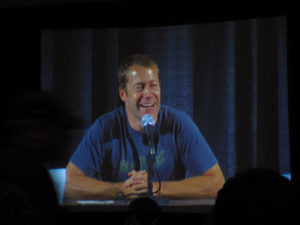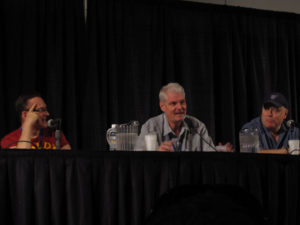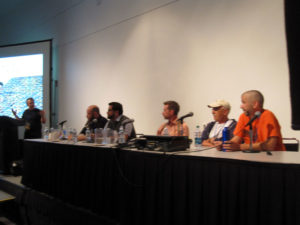By day three folks had grown more comfortable, Artists Alley tables were getting sparse as people were running out of stock, and the volunteers were better informed and less overwhelmed. Things went pretty smoothly apart from the whole running-out-of-programs thing, but people got creative and took pictures of the programming schedules on their phones. No biggie.
Before going into specific panel responses, I’d like to thank all the people who helped put Denver Comic Con together, everyone from the most famous media personalities, to the local teachers and authors, from the huge comic names to the local illustrators in the artist alley, from the highest tier of administrators to the volunteers doing it for the love. Over twenty thousand people attended the first Denver Comic Con, and I can safely speak for every one of them when I say: Thank you, every one of you. We’re so glad to finally have our own comic and geek culture convention. Thank you.
Now for some panels!
How to Break In to Sci-fi, Fantasy, and Horror
Again, I was drawn to a panel about writing, but this one was more specifically tailored toward aspiring writers rather than a discussion of the state of a given genre. Guests included: panelist and moderator Mario Acevedo, President of the Rocky Mountain Chapter of the Mystery Writers of America; Carrie Vaughan, “Kitty Norville” series; Betsy Dornbusche, editor at ElectricSpec; Peter Wacks, “Howl,” “Second Paradigm”; and Jason Heller, “Taft 2012,” and non-fiction editor at Clarkesworld. (Keep an eye out for in-depth panel report coming soon.)
Each panelist started by talking about their own respective entrances into the world of professional writing, and as usual none of them were quite the same. One thing stood out in every story though, each writer could trace their desire to write back to early childhood. Some of them stuck with it throughout their lives, some had to come back around to it, but each spoke about writing stories or poems at ages younger than ten. If you’re a writer, it would seem, it’s in you all along.
The topics covered included networking, query letters, agents, publishing, and of course what it takes mentally and in terms of disciple to be a successful writer. The conversation was definitely tailored toward those writers who have already begun (or about to start) submitting pieces for publication, and people who have already established themselves as aspiring writers, in their own minds if nothing else. It was a great, entertaining panel bursting with great information for up and coming writers.
At one point, Vaughn said with a chuckle, “I’m sorry but I’m going to ruin books and movies for all of you. You can no longer be a passive consumer of media. If you hate a book or a movie, figure out why. If you love a book or movie try to figure out why. Analyze everything and try to figure out how to do it right.”
Near the end, Wacks reinforced the message that united the whole conversation and said, “The days of the Fortress of Solitude are gone, they days of the Lone Writer. You need to reach out and communicate in whatever way works for you.” This was a fantastic panel overall, and I learned a lot. I hope the DCC continues to emphasize education- and career-oriented panels alongside the classic entertaining, nerdy ones.
Eureka‘s Colin Ferguson (Sheriff Carter)
If you’ve ever seen an episode of Eureka you’d instantly recognize Colin Ferguson as Jack Carter. He was personable, charming, and very funny. Hell, after seeing this panel I might even have a little hetero-celebrity-crush on the guy. The schedule had the room booked as a Walking Dead panel, but shooting ran long and both Lauren Cohan (Maggie) and Steven Yuen (Glenn) had to cancel their DCC appearances, so Ferguson filled in.
He had a ton of stories to share about his life as an actor, what it’s like to be on the set of Eureka, and what it’s like to share a studio lot with a ton of other sci-fi shows. Someone in the audience asked how many Jeeps had been destroyed on set, Ferguson said fourteen destroyed, thirteen on purpose. He explained, “You spend 16 hours on set in one day, and eventually you need to blow off some steam. So let’s say, hypothetically, you’re driving a Jeep really really fast downhill. And hey, it’s not your Jeep. Then let’s say there’s this corner, and you want to see how fast you can take that corner. Well, funny thing about tires, when they get hot they lose traction. Who knew? Can’t put a price on knowledge, I guess. [Laughs.]”
Another audience member asked about the scariest stunt he’d ever had to do on set. Ferguson admitted that he has a fear of heights, and one time he had to climb a really tall ladder in a scene. Apparently regular ladders don’t look good on film, so he was climbing a ladder with enormous rungs that he could barely get his hands around. He laughed and said, “They have, like, one six by four foot mat, and they say, ‘You know, if you fall, just aim for the mat.’ Oh, yeah, okay. But the funny thing is, it has nothing to do with my safety, it’s purely an insurance thing. You know when you see actors in costume, and someone is standing there holding an umbrella over them? Yeah, that’s for wardrobe, it has nothing to do with the actor.”
The best on-set story by far was about the episode where Carter had to walk through the streets of Eureka nude. “We’re not the kind of show that can shut down a whole city block. So I just had to walk across town naked, and basically wearing a sock. That’s a nice day, when you open up your costume closet and it’s basically a single sock on a hanger. Oh boy. … The worst part of the nude scene though, was like: Imagine if one day you go to work, with all the people you have to see every day, and your boss says, ‘Okay, so you need to walk around naked and you get to cover basically one part of yourself.’”
He gave some advice to young actors that’s worth repeating, “The journey for a younger actor is hard. You want to please the director, and all these other people you work with, but somewhere between pleasing them and pleasing yourself is integrity. Also, just be gentle on yourself, and be kind to yourself, because it’s tough out there, and everyone else is going to be hard enough on you.”
Cartoon Voices with Billy West, Tom Kane, and Mark Ryan
This panel was an absolute treat, and I’d been looking forward to it all weekend. Unfortunately the programming guide promised an event that didn’t actually happen. The guide said that the guys would be reading various things, like Shakespeare, in their character voices, but instead they just talked about how they got started in voice over and what their careers have been like. Even though I was let down a little, being a huge voice over nerd, I could listen to voice actors talk about their careers all day.
If you don’t know who Billy West is—first of all, shame on you—he’s best known for his unmistakable work on Ren and Stimpy, Doug, and more recently, Futurama where he plays Fry, Farnsworth, and Zoidberg. Tom Kane started doing voice work at 15, and now his voice is everywhere. Kane is best known for his work as Yoda on The Clone Wars, and Professor Utonium on The Powerpuff Girls. Mark Ryan is best known as Ironhide, Jetfire, and Bumblebee in various Transformers properties. Ryan is also famous for being the only man to get the word “bollocks” into Transformers.
This panel was absolutely hilarious, and how could it not be with Billy West on the mic. If you’ve ever heard him in an interview, you know what I’m talking about. It was such a treat to watch all the actors physically slip in and out of character every time they assumed one of their character voices.
West started talking about the creation of a cartoon. “They pay us to come and do some sort of alchemy, which is the essence of any cartoon. You’ve got all these artists and guys who wrote it that created it, then you’ve got a guy who’s gotta direct it, and they are all of one mind. Usually. So in you come and you wanna be of that one mind too, so you listen to everything they have to say.”
That led to an interesting discussion of the changes the panelists have noticed in the industry, most notably the loss of a holistic creation process, and the edging out of voice talent from the creative process. They talked about how, on older projects, they would often work closely with writers to create their characters, they would do some ad-libbing in studio, and generally bring their own creative input to the projects. Kane said, “I hope we’ve not seen the end of that.” But apparently, that’s becoming rarer. More and more, the acting talent isn’t allowed to bring anything to the table. Kane continued, “I think that things have changed a bit, and I don’t know how we’re going to get back to that, … Accountants have gotten control of the business.”
West responded by saying, “It’s become the renaissance years for people with no talent. ‘What’s that, he can fart the national anthem? Sign him up!’ … On one side of the table you’ve got people that don’t know what it feels like to have an idea. They have thoughts. … Then on our side of the table you’ve got people who don’t know what it feels like to not have an idea. How does that ever come together? That’s the problem. That’s where committees come in and gangbang you while you’re just trying to bring some art to the picture.”
It was an entertaining and very informative panel. I hope they continue to bring in such talented voice talent in upcoming years.
Writing for Comics with the Pros
Pretty self-explanatory title, here. The panel was moderated by William Kuskin, Chair of the English Department at CU Boulder and instructor for the “Comics and Graphic Novels” studies class—and for any students out there, it’s a really great class. Panelists included: Jason Aaron, “Scalped,” “Wolverine,” “The Incredible Hulk”; Steven Seagle, “Like a Bird,” “X-Men,” “Sandman Mystery Theatre”; Ron Fourtier, “Green Hornet,” “Terminator,”; Matt Kindt, “Super Spy,” “3 Story,” “MIND MGMT”; and Elliot Serrano, “Army of Darkness.” (Keep an eye out for in-depth panel coverage soon.)
As is customary for these things, the panel started by sharing their stories about breaking into the comics industry. And once again, no two were alike, but there was a unifying message that all the creators brought forward, and this theme carried the momentum of the whole panel: “Do it. Just make something,” and, “If you want to be a writer, then be writing.” It’s both easy, and very hard. The panel seemed to agree with Aaron who said it best toward the end of the panel: “The hardest part of getting into comics is what you all should be doing right now. You should be doing the hardest work you’ll ever do as a writer, and it’s gonna suck for a while. You’re not gonna make much money for a while, but if you can get there, if you can get to the point where you can do this for a living, it’s awesome. It’s totally worth all the shit you’ve gotta go through to get to that point.”
A few were quick to point out and emphasize that “breaking in” to the industry, and “making a living” were two very different things. The always entertaining Steven Seagle put out a challenge for anyone out there who wants to write professionally, anyone who thinks they can make a living doing it.
The first part goes like this: For thirty days, write five days a week, at the exact same time every day for the exact same amount of time every day, which for the first part of the challenge will be fifteen minutes. “Your fingers need to be moving on a keyboard, or pushing a feather quill or pencil or whatever you’re doing—carving in tablets, whatever works for you—for the entire fifteen minutes.” No thinking about what you’re going to write, and no rewriting or editing. That means you have to do all your pre-writing and research and outlining ahead of time. “You’re going to treat it like a job, five days a week, you’re not going to miss it for any reason, you’re going to turn your phone off, you’re not going to check the internet. … And if somebody calls and says, ‘Hey let’s go to Seven-Eleven,’ you’re going to say, ‘No, I’m working.’ But you’re not going to say that, because you won’t have answered your phone.” He suggests, “If you get stuck, if you have block, then you’re going to switch and start writing something you already know, like the Wizard of Oz, from memory. Because you can’t remember the Wizard of Oz so it’ll still be writing.” If you succeed at this for a month, do another month at thirty minutes. Then another at an hour. “If you make it through three months of that, you probably can write. But if you don’t make it through the first week, where you missed a day or whatever, then maybe don’t think about writing.” He says that in twenty-eight years of giving this assignment, he’s only had two people successfully make it through the six-month block he prescribes.
From there, the conversation turned to genre, and Matt Kindt gave one of the best, simplest analogies for genre I’ve ever heard. He talks about writing mini-comics in college about things like art, and how much he hated his job, but he realized they weren’t fun for him. Then he decided to add a detective and make it this other thing, and found that he was having fun and getting excited about his stories again. “To me, genre is like this candy coating that you can put around a real story.”
The panelists gave a lot more insight into the craft and the specific minutia of writing for the comics medium. Especially in terms of collaboration and understanding graphic storytelling. But that will have to wait for the panel-specific article, keep an eye out for that.
This wraps up my day-by-day coverage, but there’s plenty more to share. Thanks for reading, I hope you’ve enjoyed it so far, and there’s definitely more to come.
[Connor Cleary is an author, video game columnist and critic, and a freelance web-slash-graphic designer. He is a reviewer at GameShark and an occasional opinion and analysis columnist at Gamasutra. His freelance design business is Four Stair Multimedia and Design. You can follow Connor @The_Blue_Key, or at fb/TheBlueKey, or check out his writing archive on tumblr, The Blue Key.]


